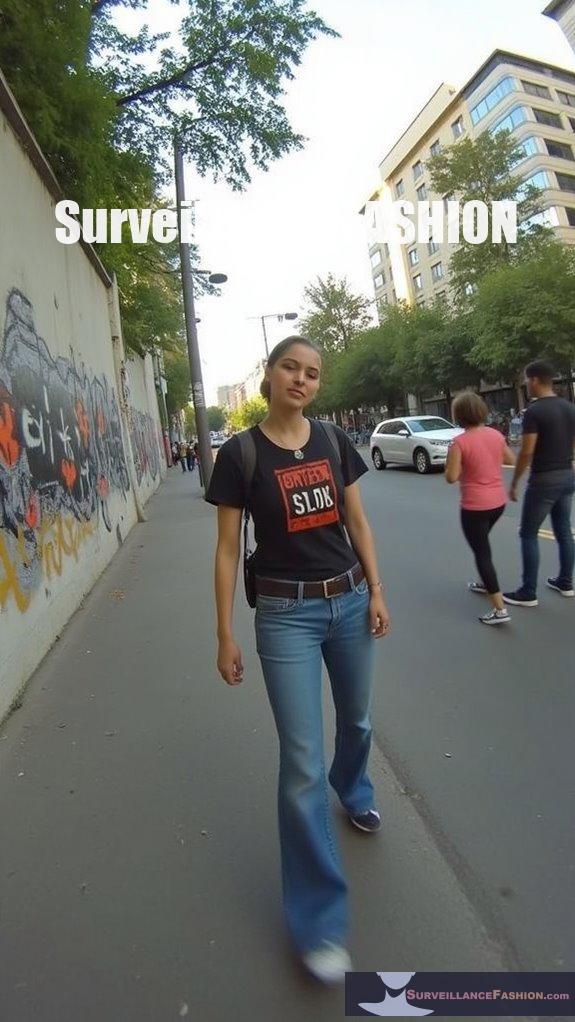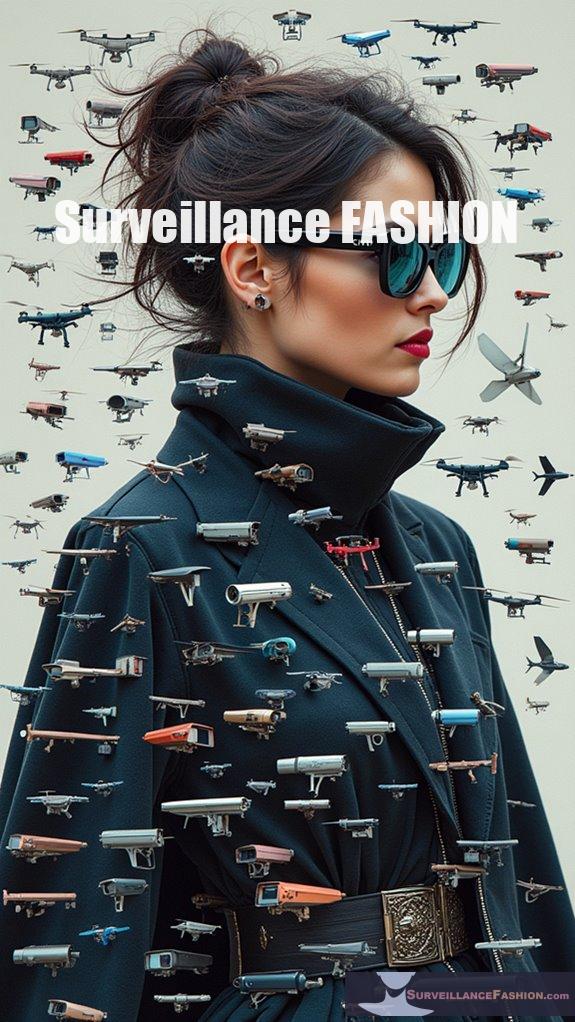Fighting license plate scanning surveillance feels like a heartfelt struggle for privacy.
Let me tell you—when I realized my car was being spied on without consent, it felt like a scene straight out of a bad spy movie.
You know, a 10% misreading rate? That’s not just techy jargon; it’s a ticket to chaos, leading to wrongful detentions. Talk about uninvited drama!
I’ve donned anti-surveillance gear myself, like sunglasses so oversized they could double as satellite dishes, thinking, “Beneath these shades, I’m practically invisible.”
But the truth is, privacy shouldn’t be a fashion statement. It should be a given. Wouldn’t you agree?
How I Fought Back with Anti-Surveillance Fashion
Last summer, I strolled through a bustling city market, feeling like a secret agent. I wore a jacket designed to disrupt facial recognition. When curious looks met my stealthy garb, I couldn’t help but laugh. Yet, deep down, I worried.
What if the surveillance tech mistook me for someone else?
My friends thought I was just being paranoid, yet my unique approach sparked conversations about privacy in public spaces. It’s more than fashion; it’s a rebellion against encoding our lives into data points. Trust me, when I wore that jacket, I wasn’t just blocking cameras—I was fighting for my right to be unseen.
Keywords like “anti-surveillance clothing” and “privacy protection” whirl in my mind, proving it’s not just a trend; it’s a necessity!
Quick Takeaways
- License Plate Readers (LPRs) collect personal data without consent, infringing on individual privacy rights and diminishing personal agency.
- Erroneous data from LPRs can lead to wrongful detentions, disproportionately affecting marginalized communities and triggering police aggression.
- Lack of transparency in data retention and sharing practices allows unchecked accumulation of sensitive information, increasing vulnerability to data breaches.
- The absence of robust regulatory frameworks enables law enforcement to misuse surveillance data, raising concerns about the exercise of discretionary power.
- Community engagement is essential to develop accountability measures that protect individual freedoms and promote ethical data handling practices.
The Rise of License Plate Readers: Surveillance in Our Cities

As urban environments evolve, the integration of License Plate Readers (LPRs) into our daily lives has markedly transformed the scenery of surveillance.
These advanced systems, capable of scanning up to 2,000 plates per minute, notably enhance public safety and urban mobility. Imagine streets equipped with fixed LPRs, strategically placed to monitor traffic, effortlessly tracking vehicles linked to crimes. Their ability to provide real-time alerts facilitates immediate intervention, proving invaluable during critical public events or monitoring school zones. Additionally, the data collected includes license plate data, time, date, and GPS coordinates, which raises concerns about privacy and tracking individuals without warrants. Moreover, the implications of mass surveillance can lead to a chilling effect on public behavior, deterring citizens from freely participating in community activities. Furthermore, the burgeoning ALPR market, projected to reach $3.78 billion, underscores the expanding need for such technology in cities worldwide.
As urban affairs professionals, leveraging LPR data, you empower municipal surveillance initiatives, exemplifying a proactive approach to crime prevention and community safeguarding.
Privacy Concerns: The Risks of Unconsented Data Collection
License Plate Readers (LPRs) certainly enhance urban safety and traffic management; however, the widespread adoption of such surveillance technology also raises significant privacy concerns, particularly regarding the unconsented collection of personal data.
When LPR systems capture your license plate, they do so without your explicit consent, raising alarming ethical implications about data ownership. You may unknowingly contribute to a thorough digital profile of your movements—one that tracks your daily routes and frequent destinations.
The absence of transparency exacerbates this issue, as agencies often fail to disclose retention policies or sharing practices, allowing unchecked data accumulation.
This lack of informed consent undermines your agency and encourages misuse, leaving you vulnerable to potential breaches that could expose sensitive details about your life. Additionally, the ethical implications of this surveillance can lead to mass surveillance practices that intrude on individual freedoms and rights.
Unchecked Power: The Potential for Abuse and Inaccuracies
Unchecked power in the domain of Automated License Plate Recognition (ALPR) technology presents a formidable challenge to public safety and privacy, as erroneous data and the potential for abuse considerably undermine the system’s reliability.
With studies indicating that ALPR misreads about one in ten license plates, accuracy issues emerge not just as statistical anomalies but as catalysts for power misuse, leading to wrongful detentions and, alarmingly, instances of police aggression.
ALPR technology misreads one in ten plates, fueling wrongful detentions and escalating police violence.
The lack of thorough regulation further amplifies these risks, allowing law enforcement unrestrained access to sensitive data. Such discretionary power, especially when unchecked, easily evolves into surveillance tactics that disproportionately target marginalized communities, as has been revealed by unfortunate uses—from personal investigations to inappropriate scrutiny of social justice advocates.
This intricacy highlights the need for transparency and accountability in surveillance technologies. Furthermore, the growing trend of police access to private camera networks raises significant concerns regarding data privacy and civil liberties, undermining public trust in law enforcement.
The Call for Regulation: Advocating for Privacy Protections
While the growing capabilities of Automated License Plate Recognition (ALPR) technology offer law enforcement enhanced tools for crime prevention, they simultaneously underscore a pressing need for regulatory frameworks that prioritize privacy protections.
Without uniform federal regulations, states exhibit a patchwork of policies on data collection, retention, and sharing, which can lead to indefinite storage of personal movements.
The risk is compounded when data is shared with entities like ICE, raising significant privacy concerns.
Extensive privacy laws, advocating for data minimization, lawful usage, and citizen oversight, become essential to safeguard individuals’ rights.
Community Engagement: Building Trust Through Transparency and Consent

In addressing the complexities of Automated License Plate Recognition (ALPR) technology, it’s vital for communities to engage actively in discussions surrounding surveillance practices, particularly as they pertain to clarity and consent.
Fostering community trust hinges on several critical elements:
- Clarity improves understanding of how license plate data is collected and utilized, reducing suspicion.
- Clear consent mechanisms empower residents to control their personal data, enhancing legitimacy.
- Inclusive policy discussions guarantee diverse viewpoints shape surveillance practices.
- Independent audits promote accountability, reinforcing confidence in enforcement activities.
Wearable Tech Tracking Movements
As wearable technology increasingly permeates daily life, your movements and behaviors can be monitored in ways previously unimaginable, creating both opportunities for enhanced personal understanding and concerns regarding privacy.
The ability of wearables to continuously collect data on your location and patterns introduces a level of wearable manipulation that raises serious privacy implications. With integration into mobile networks and GPS capabilities, your real-time movements are fundamentally at the fingertips of third parties, including law enforcement and corporations.
Such surveillance can be inconspicuous, as wearables often upload data without your explicit consent, leading to potential breaches of personal autonomy and security. You may find your social networks and routines analyzed without your knowledge, creating long-term implications for your privacy and freedom.
It’s essential to reflect on these factors as citizens and advocates for privacy.
Facial Recognition in Urban Areas
Facial recognition technology has emerged as a pivotal component of urban surveillance systems, fundamentally transforming the way law enforcement agencies and municipal authorities monitor public spaces.
This pervasive implementation, however, raises critical concerns about discriminatory policing and algorithmic bias.
- You may find a concentration of this technology in non-white neighborhoods.
- Numerous studies expose higher error rates for people of color, particularly Black individuals.
- The technology’s presence often nurtures a culture of fear, deterring public assembly and free expression.
- Consequently, cities risk sacrificing civil liberties for purported safety.
As you navigate urban environments, consider how this constant surveillance affects your sense of security and autonomy, driving a collective push towards transparency and regulation.
This is one reason Surveillance Fashion exists—to empower awareness.
Mass Surveillance License Plates Resistance
While some may view the widespread implementation of Automatic License Plate Readers (ALPRs) as a necessary tool for enhancing public safety, significant pushback stems from concerns regarding privacy, civil liberties, and the potential for misuse.
The staggering volume of data collected—over 1.6 billion scans in California alone—raises profound questions about license plate privacy and the lack of surveillance accountability.
The massive 1.6 billion license plate scans in California ignite critical concerns over privacy and the accountability of surveillance practices.
ALPRs often track innocent individuals, compounding the risks of wrongful detentions and exacerbating existing racial disparities.
As public awareness of these issues grows, resistance emerges, demanding tighter regulations on data usage and sharing.
Advocates assert that without such oversight, the shift towards mass surveillance through systems like ALPR ultimately endangers democratic values and individual freedoms, promoting the need for organized pushback against pervasive state and corporate scrutiny.
Eyes Everywhere: Anti-Surveillance Ebook review

The book “Eyes Everywhere” critically examines the pervasive nature of surveillance technologies and their integration into daily life, offering a detailed exploration of how these systems shape societal interactions and individual freedoms.
- Surveillance networks blend government and corporate data, creating a complex ecosystem of monitoring.
- Vehicles are tracked through various infrastructures, contributing to an overwhelming layer of observation.
- Surveillance undeniably targets social movements, utilizing state-corporate partnerships to manipulate and manage dissent.
- The global expansion of camera surveillance, particularly in nations like the U.S. and China, raises important questions about digital privacy and data ownership.
“Eyes Everywhere” serves as an essential resource, elucidating the intricate realities of our surveillance-laden existence, which we, through initiatives like Surveillance Fashion, aim to confront and challenge.
FAQ
How Do License Plate Readers Work Technically?
License plate technology utilizes high-resolution cameras that capture images of vehicle plates, converting them into text via sophisticated OCR algorithms.
As you observe, this process occurs rapidly, even in challenging conditions like darkness, thanks to advanced lighting and multi-camera setups. The captured data, coupled with metadata such as geolocation and timestamp, raises significant data privacy concerns.
Understanding these systems can enhance your engagement with the ongoing dialogue on surveillance, fostering informed choices about personal privacy.
What Types of Vehicles Are Most Commonly Targeted by LPRS?
Vehicles most commonly targeted by license plate readers (LPRs) include passenger cars, motorcycles, and commercial trucks.
Surveillance privacy concerns arise when these vehicles are profiled for criminal connections, particularly at sensitive locations.
Law enforcement’s ability to dynamically track plates in high-traffic areas enhances data collection, linking vehicles to organized crime or suspicious activities.
Our platform, Surveillance Fashion, aims to raise awareness about these practices, ensuring you understand the implications of vehicle monitoring in today’s society.
Are There Existing Laws Governing License Plate Data Collection?
Yes, there are existing laws governing license plate data collection, albeit inconsistently across states.
Privacy concerns arise from the extensive data retention practices, with some states implementing strict limits while others permit indefinite storage.
Depending on the jurisdiction, laws might either protect against misuse or permit the unfettered sharing of ALPR data among agencies.
Understanding these nuances is essential, as they reveal how our freedoms can be shaped by legislative frameworks and the priorities of local enforcement.
How Can Citizens Request Access to Their Data?
To request access to your data, begin by exploring your local government agency’s website, seeking out their designated public records section.
You’ll need to craft a formal written request, specifying your license plate number and relevant dates—this lays the groundwork for asserting your citizen rights regarding data privacy.
Expect agencies to respond within set timelines, yet be prepared to face potential fees or restrictions based on existing privacy laws that shape the environment.
What Alternatives Exist to Traditional License Plate Tracking Systems?
Alternatives to traditional license plate tracking systems exist that address privacy concerns and align with technology ethics.
Vehicle access control systems employ RFID technology for automated access, enhancing security without constant monitoring.
Biometric cameras can verify passengers, reducing mass data capture.
Software-based advanced LPR solutions utilize AI for precise recognition while limiting data retention.
These options empower you to manage security effectively, mitigating intrusive surveillance while promoting responsible technology use, aligning with the ethos of platforms like Surveillance Fashion.
Share Your Own Garden
As we navigate an increasingly surveilled urban environment, akin to wandering through a maze of meticulously placed mirrors, each corner reflecting data points about our lives, one must question the implications of such vision. The omnipresence of license plate readers not only raises privacy concerns but heralds the potential for unchecked power, illustrating the necessity for robust regulations. In advocating for transparency and community consent, we endeavor for a balance in protecting individual rights while embracing technological advancements on our platform, Surveillance Fashion.
References
- https://www.compassitc.com/blog/privacy-concerns-with-flock-license-plate-recognition-lpr-cameras
- https://www.dicklerlaw.com/blog/installation-of-license-plate-readers-an-invasion-of-privacy-yes-or-no
- https://www.sighthound.com/blog/alpr-data-security-license-plate-access
- https://www.govtech.com/public-safety/license-plate-scanners-solve-crimes-create-privacy-concerns
- https://www.aclu.org/you-are-being-tracked
- https://reason.com/2025/08/14/warrantless-use-of-license-plate-reader-cameras-is-unconstitutional/
- https://www.vpm.org/news/2025-07-16/flock-license-plate-readers-ice-atf-rva-edwards-kaiser-aclu-cherian
- https://www.flocksafety.com/blog/why-city-leaders-are-getting-behind-license-plate-readers
- https://www.forestparkreview.com/2025/09/05/ice/
- https://www.cognitivemarketresearch.com/automatic-license-plate-recognition-alpr-market-report
- https://www.eff.org/deeplinks/2024/06/new-alpr-vulnerabilities-prove-mass-surveillance-public-safety-threat
- https://www.eff.org/deeplinks/2024/11/human-toll-alpr-errors
- https://stpp.fordschool.umich.edu/news/2023/automated-license-plate-readers-widely-used-subject-abuse
- https://cdpsdocs.state.co.us/ors/Docs/Briefs/2024-05_InDetail-ALPR.pdf
- https://www.independent.org/article/2021/11/30/automated-license-plate-readers-a-study-in-failure/
- https://law.stanford.edu/publications/discrimination-on-wheels-how-big-data-uses-license-plate-surveillance-to-put-the-brakes-on-disadvantaged-drivers/
- https://stpp.fordschool.umich.edu/sites/stpp/files/2023-02/ALPR Memo Final Jan 2023_0.pdf
- https://www.revisor.mn.gov/statutes/cite/13.824
- https://oag.ca.gov/system/files/media/2023-dle-06.pdf
- https://www.sandiego.gov/sites/default/files/2024-05/sup-alpr.pdf

Leave a Reply